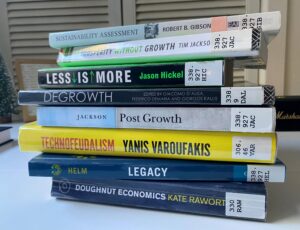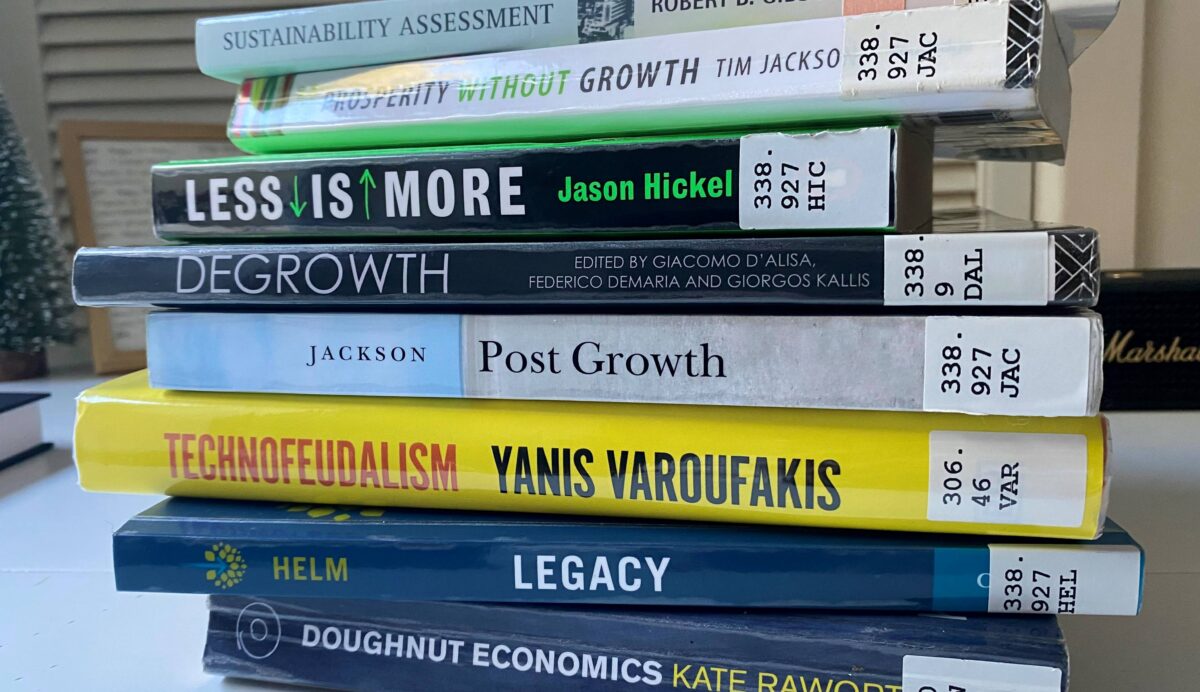Zung Nguyen, MBA Business Administration student, shares her experience exploring the concepts of degrowth and the power of our individual actions. Zung shares her top tips to help you reduce your consumption in everyday life.
Last weekend, I did something that made me feel good.
I took a few hours to scan my apartment and categorise each item into two groups: things I bought because I needed them and things I wanted. To my surprise, quite a heavy portion of what I owned fell into the second category. Then I returned most of my recent purchases.
So what sparked this change?
The motivation came from a debate I’d had earlier in the week during a sustainability lecture. We were discussing degrowth, an economic concept that challenges the obsession with perpetual growth and instead advocates for reducing consumption and production in wealthy nations to stay within the Earth’s ecological limits. I argued that degrowth, while idealistic, feels inherently against human nature, recalling Yuval Noah Harari’s Sapiens, where he writes:
“One of history's few iron laws is that luxuries tend to become necessities and to spawn new obligations. Once people get used to a certain luxury, they take it for granted. Then they begin to count on it. Finally they reach a point where they can't live without it.”
Degrowth is personal
But that weekend, something shifted. I decided to make a small change. I began to think less about the huge and heavy system and started thinking about personal agency. If I, as one person, had purchased things I didn’t need, what about the other 20,000 students in Bath? Or more than the 100,000 residents of our city? Or the 69 million people across the UK?
The following day, I joined the Green Impact team conducting a sustainability audit in the School of Management building. I was genuinely impressed by the sustainability progress we are making as a University community, but I couldn’t help thinking: can we still do better?

I started to read more about the degrowth movement, and I learned how the movement challenged the idea that human progress must be tied to economic expansion. Instead, what if we measured success not by financial measures, but in wellbeing, equity, and sustainability.

The power of the crowd, and the individual
In the fashion industry alone: Up to 100 billion garments are produced every year, generating 42 million tonnes of plastic waste per year, this makes the textile industry the second-highest industrial sector after packaging. To top it off, only 1% of clothes will get recycled into new garments and the UK throws away 300,000 tonnes of clothing annually.
There's a quote that I found powerful by Margaret Mead:
“Never doubt that a small group of thoughtful, committed citizens can change the world. Indeed, it is the only thing that ever has.”
If individuals like us choose to consume more mindfully, we will collectively influence demand. It’s a ripple effect.
Now imagine if we applied the same logic at scale. If we all start choosing quality over quantity, experiences and services over materials. Apparently, shops and production businesses will not like this, but they will have to change, and the market will have to adapt.
The opportunity for innovation
While degrowth critiques the “grow at all costs” mentality, it doesn’t reject innovation. On the contrary, it encourages us to innovate differently; to create closed-loop systems, reuse waste, design longer-lasting goods, and build regenerative economies.
So yes, economic development can still happen, but not at the cost of our planet.
Buy what we need, not what we want
In a time of climate crisis, resource depletion, and rising waste, you can make changes by asking a simple question: do I really need this, or do I just want it?
When I returned my unnecessary purchases, it wasn’t just about clearing space, it was about shifting my mindset. Degrowth doesn’t mean doing without, it means doing better. It's a strong act of resistance in a system built on endless consumption.
My top tips for embracing degrowth in daily life
As highlighted in the University of Bath’s Student Guide to Living Sustainably, there are many easy and impactful steps we can take as students. Here are a few of my personal favourites that will also help your budget:
- Less is more, pause before you purchase, ask: do I need this? Look out for clothes swaps and second-hand sales on campus.
- Refill, don’t landfill: use your refillable water bottle and coffee cup, tap water in Bath is clean and free.
- Eat smart: try adding fruit and veg into your diet and reducing meat and dairy, try a meat-free Monday to get started.
- Think circular: before you bin something, ask: can I fix it, donate it, or recycle it? Share and Repair run sessions throughout the year in the SU.
- Engage and share: join a sustainably-minded society, volunteer with the SU V-teams, or simply start a conversation with your flatmates about sustainable swaps.

Zung Nguyen
MBA Business Administration
Respond



